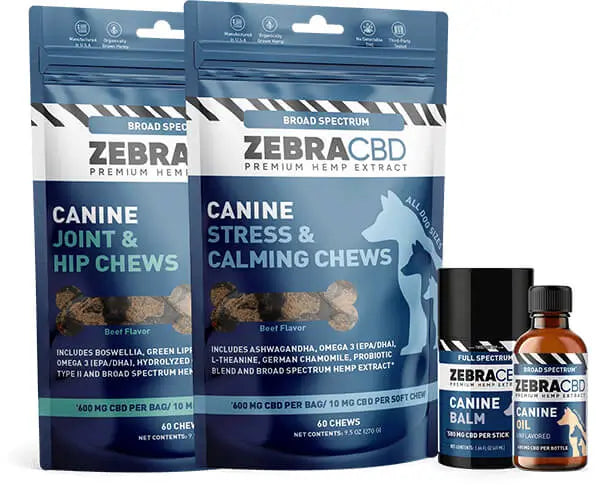
From sneezes to itchy skin, allergic reactions can leave your pup feeling slow, sleepy and in no mood to fetch. If you’re a dog owner dealing with an allergic dog, you’re likely wondering how to help your furry friend feel their best again. Fortunately, there are several options to help kick canine allergies to the curb.
If you’re asking, “What can I give my dog for allergies?,” this article will explore a variety of doggy allergy solutions from home remedies to common medications.
#1 New Food
A healthy diet is at the center of canine wellness, and a dietary switch could be the simplest way to help with your dog’s seasonal allergies. Often, puppy allergies are directly related to dietary issues and food sensitivities, so the first step toward helping your pup is identifying any ingredients that could cause a potential allergic reaction, including:
- Soy – Made from soybeans, soy proteins are a common ingredient in many dog foods. While soy may be a substantive source of protein, some dogs may have developed an allergy or food intolerance to soy products.
- Gluten – A protein found in cereal grains like wheat, gluten can cause unexpected allergic reactions in dogs. There are several gluten-free dog commercial foods available, and those interested in crafting homemade gluten-free meals for their pup can find numerous healthy options.
- Meat proteins – Beef, chicken and even eggs contain proteins that may result in an allergic reaction. Nearly every dog food is made with some combination of meat proteins. Fortunately, if your dog has a food allergy to one protein, it should be fairly easy to replace it with another.
Notably, all these ingredients are generally considered safe for dogs, but allergies can develop at any time. To determine whether your dog is allergic to a certain ingredient, consider using the process of elimination.
By changing your dog’s diet and swapping out food options, you may be able to pinpoint what ingredient is causing allergy symptoms and reactions.
As always, ensure that your dog is consuming a balanced diet, and if you have any particular dietary concerns, consult with your veterinarian.
#2 CBD
Soothing, relaxing and non-psychoactive, CBD has earned a reputation as wellness support for humans and dogs alike. CBD not only offers potential body and mood support, but it also may help with the various symptoms of dog allergies.
So, what is CBD? It’s a naturally-occurring compound found in the hemp or cannabis plant that offers various health-supporting benefits without any psychoactive effects. CBD has long been used by humans and remains a popular supplement option for those looking for wellness support. It’s also gaining popularity within the canine space.
While CBD does not cure or treat allergies directly, like many remedies, it may provide relief by targeting the following:
- Itch and irritation – One of the worst side effects of dog allergies is irritated, itchy skin. This irritation can lead to excessive scratching and even hair loss. Fortunately, CBD balms are designed to combat your dog’s skin allergy and support healthy skin health to provide comfort to your pup.
- Restlessness and unease – Allergies can lead to more than physical problems. If your dog is suffering from allergy-related discomfort, a CBD chew may provide relaxing support to help them feel more like themselves again. Additionally, it makes a great snack to help perk up your pup's mood, no matter how they’re feeling.
- Supplemental support – High-potency CBD extracts are often crafted with health-supporting vitamins and natural ingredients to fortify your pup's health. The extra support from a CBD supplement could help support your pup's comfort level on a daily basis and encourage more physical activity.
Today, CBD is widely available for dogs in topical formulations, chewable treats and even oils. Additionally, many CBD products for dogs are crafted with additional vitamins, minerals and natural ingredients to create a powerful, health-supporting supplement that your dog can enjoy regularly.
#3 Epsom Salt
An age-old remedy for stiffness, Epsom salt has been used for hundreds of years. Made from magnesium sulfate, this mineral compound is ideal for a relaxing, restorative bath. Epsom salt can also help with dog seasonal allergies and skin irritations.
Simply mix a cup of Epsom salt in two gallons of warm water to create a soothing bath for your pup.
Epsom salt can be especially useful for issues like:
- Rashes and coat issues – Oftentimes, allergic reactions lead to red, itchy skin. Additionally, skin problems may lead to dry and damaged fur for your pup. A series of Epsom salt baths could help relieve skin problems and leave your dog’s fur looking soft and smooth.
- Swelling – When allergic reactions lead to redness and swelling, a short soak in Epsom salt could help mitigate the issue. After only 10 minutes of soaking, your dog may start to feel healthy again.
- Minor wound care – If puppy allergies have led to excessive scratching, Epsom salt could help support the healing of scratches and minor cuts. That said, more serious cuts and scrapes should be examined by a veterinarian to protect against potential complications.
Is your pup a little reluctant to step into the bath? Try to make the activity fun and accommodating by offering treats, toys and praise. There’s no reason bath time can’t be an enjoyable experience for you and your pup.
#4 Antihistamines
Over-the-counter medications have been widely used to help dogs with their allergies. In fact, many of the same medications that humans use for their sniffles and sneezes can also benefit dogs.
Antihistamines can help mild to moderate dog allergies with minimal side effects, providing relief to a dog that’s experiencing redness, sneezing or itchiness.
Before considering an antihistamine for your dog, be sure to follow these recommendations:
- Get veterinary approval – You should always check with your vet before administering any medications to your pooch. While antihistamines are relatively safe for dogs, they could pose potential risks. Many antihistamines aren’t veterinary-approved and may require special instructions.
- Prepare the correct amount – A veterinarian can also provide you with an accurate amount of antihistamines to give your pup and an administration schedule. Be sure to measure out the exact amount and ensure your pup has taken it entirely.
- Monitor for side effects – Antihistamine side effects are typically visible within the first hour of exposure. Drowsiness is the most common side effect, but if you notice a more severe reaction (including accelerated heart rate or rapid breathing) consult with your veterinarian immediately.
#5 Allergy Therapy
Also known as immunotherapy, allergy therapy involves a series of regular injections aimed at treating more serious dog allergies. It might not seem practical to enroll your pet in multiple veterinary treatments just to take care of some sneezing, but for allergies that are directly interfering with your pup's overall quality of life, allergy therapy may be the best option.
Allergy therapy is designed to treat common seasonal allergies including:
- Pollen
- Dust
- Mold
- Dander
Curious about how allergy therapy works? The following is a simple explanation of what to expect:
- Book an appointment – Allergy therapy is provided by licensed therapists and veterinary professionals. Most often, the therapy is administered via injection, although drops may be an option as well.
- Desensitization – The allergy therapy introduces very small levels of an allergen into your dog’s system to help your pet develop an immunity over time. This is why allergy therapy typically takes many months and several sessions to take effect.
- Resilience – After several successful sessions, you can expect your pet to develop resilience, and, potentially, total immunity, to an allergen. Keep in mind that allergy therapy is used to treat specific allergens as opposed to general allergies.
If your dog’s allergies are leading to severe skin problems and swelling around the ears, allergy therapy may also diminish the potential for skin and ear issues. Additionally, you may notice your pup has more energy for walking, running and playing after treatment.
#6 Additional Supplements
While standard medical care can do a lot to alleviate doggy allergies, there are also several options for natural supplements to support your dog’s health. While supplements aren’t necessarily designed to treat allergies, the health-boosting benefits can go a long way to relieve systems and strengthen your dog’s immune system.
Along with full-spectrum CBD products, you might be curious to explore some common canine supplements including:
- Vitamins – Many chewable supplements contain essential vitamins and minerals designed for wellness support. In particular, B vitamins are linked to immune health and relieve the effects of allergies, and C vitamins are linked to skin health. If you’re worried that your dog isn’t receiving a full amount of their daily vitamins, consider adding a simple supplement to their everyday routine.
- Fish oils – Fish oil may offer a powerful option for nutritional support. Up your pup’s omega-3 levels by adding a fish oil supplement to their daily meals. Omega-3 offers a variety of benefits, from coat and skin support to cognitive wellness.
- Probiotics – Essential for gastrointestinal health and wellness, probiotic supplements may help relieve swelling and the various effects of food allergies. In addition, probiotics can assist with digestion, immune function and provide other intestinal benefits.
Get Relief With Zebra CBD
Today, there’s no reason to let your dog deal with their allergies alone. With a whole host of relief options, you can help your pup get over their seasonal allergy issues and get them playing, walking and fetching like they’re a puppy again.
Looking for a simple and safe way to support your dog’s health? Check out Zebra CBD to discover our entire line of puppy-approved products,
From Zebra CBD Calming Chews For Dogs to Zebra CBD Balm For Dogs, we’re developing products to encourage puppy wellness inside and out. Our products use organic, American-grown hemp and are formulated with the highest quality ingredients. Try Zebra CBD, the trusted expert in CBD for you and your furry friends.
Source:
VCA Hospitals. Food Allergies in Dogs. https://vcahospitals.com/know-your-pet/food-allergies-in-dogs
Cleveland Clinic. Should You Take an Epsom Salt Bath? https://health.clevelandclinic.org/7-things-you-probably-didnt-know-about-epsom-salt/
VCA Hospitals. Over-the-Counter (OTC) Medications That Can be Safe for Dogs. https://vcahospitals.com/know-your-pet/are-over-the-counter-medications-safe-for-my-dog
American Kennel Club. 7 Vitamins Your Dog Needs for a Healthy Life. https://akc.org/expert-advice/nutrition/vitamins-dogs-need-healthy-lifestyle/
PetMD. Probiotics for Dogs: Do They Work? https://petmd.com/dog/general-health/probiotics-dogs-what-you-need-know










